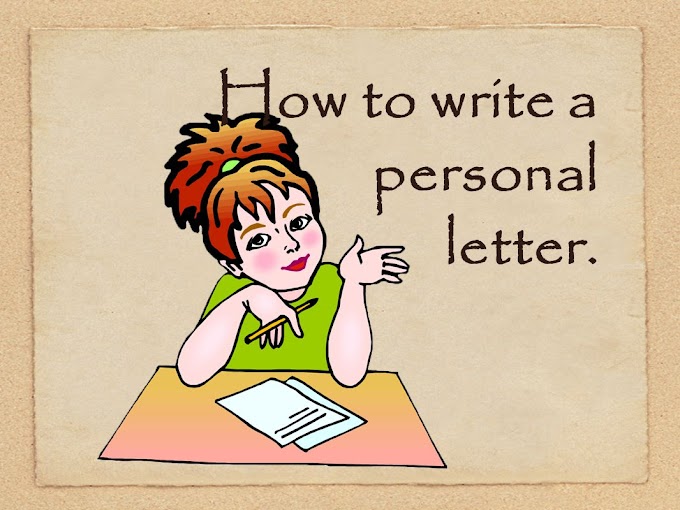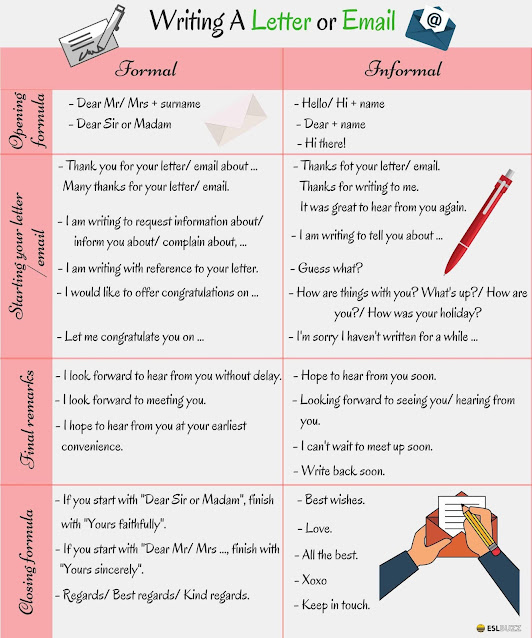Read more
Writing Personal Letters
Objectives
Through this section, you will learn
how to write personal letters
Learn about it!
Today we’re going to
talk about letter writing. We write letters to friends, strangers, businesses,
government departments, and institutions.
Communication could be conducted not only spoken but also written form. Communication in written form could be done by letter or electronic letter or e-mail. There are two kinds of letter, they are formal and informal letter, personal and institutional letter. The purpose of the letter is depend on the category of the letter. By categories, there are some such as
· Request
· Complaint
· Bussiness
· Friendy
The tone of a letter can
be formal or informal, depending on who is going to read it. There are several
purposes for writing letters:
1. giving or requesting information
2. giving instruction
3. relating an events
4. giving goods or bad news
5. complaining
6. describing
7. applying for a job
1. giving or requesting information
2. giving instruction
3. relating an events
4. giving goods or bad news
5. complaining
6. describing
7. applying for a job
Some letters can include
several of these purposes at the same time. Here are some examples.
Letters for ‘giving
information’ might include: travel plans, arrival details, what to see and
do on holidays.
Letter ‘requesting
information’ might be for: course information, library hours, timetable
information.
Some letters for ‘giving
the instruction’ include: how to get to your house, how to operate a
machine, how to open an account.
And letter ‘ relating
an events’ such as an incident or accident; a wedding, a holiday
‘Giving good or bad
new’ such as canceling an appointment, accepting a job offer, informing of
the birth of the baby.
The letter ‘complaining’
might include poor service in a restaurant, loud noise in your district, a
problem with faulty goods.
the letter ‘describing’
might be about: lost property, friends, or a place.
the letter ‘applying for
a job’ is called the application letter.
The formal letter begins
with the greeting
Dear and closing with
yours sincerely
Between the top and the button is the body if the letter.
We write because we have the purpose.
The
purposes in giving information, you might write
I am writing to advise that ...
Or for requesting information you might write
I am writing to request information about...
In giving instruction you might write
I am writing to explain how to ...
In giving good news, you can write
I am very happy to tell you that ..
Personal letters are the letter made by someone based on his/her purpose formally or
informally. The institutional letter is the letter which made by the
institution formally. In this lesson, we will practice making personal letters for requesting as the situation below.
Situation 1 (Apologies Letter Sample)
You borrowed some books from your school or college library. Unfortunately you have to go away to visit a sick relative and cannot return the books in time. Write a letter to the library! Explain what has happened and tell them what you want to do about it.Dear Sir or Madam
I am writing this letter to explain why have been unable to return the three books have out on three-day loan, which are now overdue.
After taking the books out on 16th March, I had an urgent phone call from my elderly aunt's neighbour to say that my aunt had had a fall and had been taken into hospital. I am her only surviving relative in this country, so I felt I had to go and see her immediately. I travelled down to Surrey the following morning, thinking I would stay for only two or three days. Unfortunately, my aunt's condition has only improved very slowly, so I have had to stay here longer than expected. However, the hospital says that if all goes well, she should be able to go home in two or three days' time, in which case I will be back at the beginning of next week.
Dealing in mind the circumstances I trust you will kindly waive any fines that may have accumulated
Yours sincerely
VOCABULARIES
1. Unfortunately = sayangnya
2. Immediately = langsung
3. Circumstances = keadaan
4. Waives = meniadakan/mengesampingkan
5. Yours sincerely = dengan tulus/sungguh-sungguh
6. Fines = denda
7. Overdue = terlambat
8. Neighbour = tetangga
9. Elderly = tua
10. Improved = pulih/dipulihkan/ditingkatkan
Not only the choice of the words, the structure also differs
So the generic
structure of Personal Letters is
1. The sender’s Address
2. Date
3. Salutation
4. Opening Paragraph (purpose of the
letter)
5. Body paragraph (detail information)
6. Closing Paragraph (expectation)
7. Complimentary Close
8. Signature/ Initial of written
Personal letters can be sent conventionally or by using email/electronic mail. Here presented the form of letters sending via email.

Have you ever been to your friend’s birthday party? Before going to the party, your friend gave you a letter or card to invite you. Well, this kind of letter is an example of an invitation letter. In this section, we will not only learn about invitation letters, but we will also learn how to write it on your own! Let’s get started!
Today, Hannah gets an invitation letter
from her friend, Diana. She is not sure whether she can go or not because the
party is on the same day with her drama rehearsal. The invitation letter is in
the picture below.
In your opinion, what party is going
to be held by Diana? When and where? If Hannah decided not to come, when does
she need to tell Diana?
From the picture, we can get plenty
information, we know that:
- Diana invites Hannah to her birthday party
- The party will be in Mountana Residence on Sunday, 18
July 2015
- If Hannah cannot go, she should tell Diana before 10th
July. Why? It is because, in the invitation, we can find this information
RSVP before 10th July. RSVP means that you have to confirm whether you will come or not.
So, in an invitation letter, there
should be the name of the host, information of the event, time of the event, a place to conduct the event, and confirmation date.
There are two types of confirmation
date, RSVP and Regret Only. In RSVP, we have to confirm whether we will come or
not. In Regret Only, we need to confirm only when we cannot come. Moreover, an
invitation letter is written in the present tense.
Look at the invitation letter below.
The following invitation letter is not written well. What is wrong with the
letter?
Do you find the mistake? Well, there
are some mistakes in the card. You will find illogical and missing information
in Marsha’s Invitation.
So, how is it? Have you understood what to write in an invitation letter? Are you ready to write your own invitation letter? Let’s check in the next section!
Do you understand?
Hannah is going to perform a drama. Now, she is
going to write an invitation letter to invite people to watch her Drama Show but
she is confused about what to write. Would you help her? She just wrote some
information in her notebook. Here they are:1. Name of the Drama Show: Sangkuriang
2. Conducted by Teater Bumi
3. Place: Adam Malik Hall, Aceh Street No. 21
4. Time: Monday, 20 August 2015, 7 p.m. – 9 p.m.
Now, try to write an invitation letter to help Hannah. Write it in the template below.
Have you completed the letter above? Now let's compare to the right answer. Here is the complete invitation letter for Hannah.
Keypoints
In this section, you have learned how
to write personal letter letters.
the generic
structure of Personal Letter is
1. The sender’s Address
2. Date
3. Salutation
5. Body paragraph (detail information)
6. Closing Paragraph (expectation)
7. Complimentary Close
8. Signature/ Initial of written
In writing an invitation letter, you
have to include some information. They are:
- Name of the Event
- Name of the Host
- Time of the Event
- Place
- Date of confirmation
There are two kinds of confirmation.
They are RSVP and Regret Only. Besides that, remember, the invitation letter
should be in the present tense.
Jawablah pertanyaan-pertanyaan berikut dengan jujur dan bertanggungjawab!
| No. | Pertanyaan | Jawaban | |
|---|---|---|---|
| 01. | Saya mengetahui arti kata-kata pada pada teks di atas |
Ya | Tidak |
| 02. | Saya bisa mengucapkan kata-kata sesuai dengan audio/video yang disajikan |
Ya | Tidak |
| 03. | Saya bisa memperagakan percakapan dengan membaca teks yang tersedia |
Ya | Tidak |
| 04. | Saya bisa memperagakan percakapan dengan sedikit membaca teks |
Ya | Tidak |
| 05. | Saya bisa memperagakan tanpa membaca teks |
Ya | Tidak |
| 06. | Saya bisa memperagakan tanpa membaca teks disertai dengan variasi baru atau pengembangan teks |
Ya | Tidak |
| 07. | Saya bisa membuat karya video terkait dengan percakapan yang diperagakan |
Ya | Tidak |
| 08. | Saya bisa membuat video dan telah disosialisasikan pada sosial media yang saya miliki |
Ya | Tidak |
Bila ada jawaban "Tidak", maka segera lakukan review pembelajaran, terutama pada bagian yang masih "Tidak".
Bila semua jawaban "Ya", maka Anda dapat melanjutkan ke pembelajaran berikutnya.
Buatlah jurnal harian untuk membantumu dalam mempercepat proses pembelajaran dengan menjawab soal evaluasi diri berikut ini.
- Apakah yang kamu telah pelajari pada bagian ini?
- Apa yang menarik pada sesi ini?
- Apa kendala yang kamu alami?
- Apa yang kamu lakukan untuk mengatasi kendala tersebut?
Informasi lainnya yang terkait dapat diakses pada tautan berikut ini













